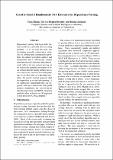Greed Is Good If Randomized: New Inference for Dependency Parsing
Author(s)
Zhang, Yuan; Lei, Tao; Barzilay, Regina; Jaakkola, Tommi S.
DownloadBarzilay_Greed is.pdf (333.7Kb)
OPEN_ACCESS_POLICY
Open Access Policy
Creative Commons Attribution-Noncommercial-Share Alike
Terms of use
Metadata
Show full item recordAbstract
Dependency parsing with high-order features results in a provably hard decoding problem. A lot of work has gone into developing powerful optimization methods for solving these combinatorial problems. In contrast, we explore, analyze, and demonstrate that a substantially simpler randomized greedy inference algorithm already suffices for near optimal parsing: a) we analytically quantify the number of local optima that the greedy method has to overcome in the context of first-order parsing; b) we show that, as a decoding algorithm, the greedy method surpasses dual decomposition in second-order parsing; c) we empirically demonstrate that our approach with up to third-order and global features outperforms the state-of-the-art dual decomposition and MCMC sampling methods when evaluated on 14 languages of non-projective CoNLL datasets.
Date issued
2014-10Department
Massachusetts Institute of Technology. Computer Science and Artificial Intelligence Laboratory; Massachusetts Institute of Technology. Department of Electrical Engineering and Computer ScienceJournal
Proceedings of the 2014 Conference on Empirical Methods on Natural Language Processing
Citation
Zhang, Yuan, Tao Lei, Regina Barzilay, and Tommi Jaakkola. "Greed Is Good If Randomized: New Inference for Dependency Parsing." 2014 Conference on Empirical Methods on Natural Language Processing (October 2014).
Version: Author's final manuscript